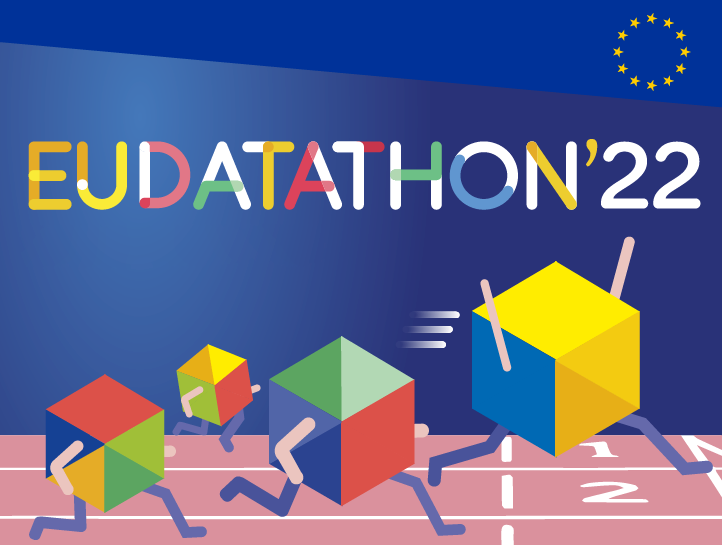
Issue 105
April 2022
ISSN 2315-0017
EU Newsflash
- 8 April: EU agrees on fifth package of restrictive measures against Russia in response to Russia’s brutal aggression against Ukraine and its people. See also the dedicated EUR-Lex page with EU measures in solidarity with Ukraine.
Spotlight on the Economic and Monetary Union
The Economic and Monetary Union (EMU), launched in 1992, was a major step for the integration of the EU Member States’ economies. It set out the coordination of economic and fiscal policies, a common monetary policy and a common currency, the euro. Arguably, it is one of the most powerful expressions of the EU’s unity and commitment to integration. Its effects extend to all policy areas, from competition and the European single market to the European Green Deal. Its benefits include, among others, monetary stability, elimination of currency exchange costs, more integrated financial markets, price transparency and a stronger voice for the EU in the global economy.
2022 marks a special anniversary for the EMU, as 20 years ago, on 1 January 2002, 12 Member States changed their national currency banknotes and coins for the euro in the largest currency changeover in history. Today, more than 340 million people use it across 19 Member States, with 27.6 billion euro banknotes in circulation for a value of about EUR 1.5 trillion. The euro is currently the second most widely used currency in the world after the US dollar.
The EU keeps up the work to strengthen the international role of the euro and adapt it to new challenges, including the rapid digitalisation of the economy and the development of virtual currencies. This edition of our newsletter features EU publications on the EMU and the euro, along with publications on a range of other interesting topics, from solar system exploration to welcoming Ukrainian children and adults seeking safety in the EU.
Understanding the Economic and Monetary Union PDF/Paper
How does the EMU work? Who are the main players involved? What caused the economic and financial crisis and how was it resolved? This booklet provides information on the EMU and its functioning. It also defines the necessary tools to avoid crises: economic policy coordination, financial stability with supervision and resolution mechanisms, and stability mechanisms to support euro-area countries that encounter difficulties.
Available in all official languages of the EU except Irish
The International Role of the Euro – June 2021 PDF
The international role of the euro is an annual review that presents an overview of the use of the euro by non-euro-area residents. This is the last available edition covering the developments of 2020. This period was characterised by the outbreak of the coronavirus (COVID-19) pandemic, an unprecedented contraction in global economic activity, and exceptional global policy support.
Available in English
The Euro in the World PDF
The ongoing reforms in the European Economic and Monetary Union can support the common currency on the international scene, and there is scope for further policies that strengthen the role of the euro on international capital markets. This publication focuses on the main drivers of the euro’s international role and the policies to support it.
Available in English
The Euro Area PDF
Report
Since the euro was introduced in 2002, the European Commission has regularly conducted surveys measuring public perceptions of the currency among citizens living in the euro-area countries. This is the latest one in the series. It evaluates support for the euro at national and EU level, views on its impact on European identity and several other points related to the common currency.
Available in English
The Impact of the Euro on Trade PDF
Two decades into monetary union
The consensus back in 2008 – just a few years after the introduction of the euro – was that the adoption of a common currency had made a limited impact of around 2 % in total on the trade flows of the first wave of euro-area countries. With the common currency now into its third decade – and with more countries queuing to adopt it – this paper revisits the trade effects of the euro, focusing on the newer euro adopters (i.e. those countries that have adopted the euro since 2007) and their interaction with the first wave of euro-area members via supply chains.
Available in English
The Digital Euro PDF
Policy implications and perspectives
This study identifies the fundamental rationale for the possible issuance of a digital euro: to preserve the role of public money in a digital economy. Furthermore, it outlines the policy options, the trade-offs and the design issues the creation of a digital euro would raise.
Available in English
Research and innovation
Restore our Ocean and Waters PDF/Paper
A synergy info pack by CORDIS
The EU boasts 68 000 km of coastline – more than Russia and the United States combined – and the area of water under EU jurisdiction is greater than its land area. However, marine and freshwater ecosystems are rapidly degrading. This publication showcases 34 research projects funded through the complementary programmes of Horizon 2020 (including the Small and Medium-Sized Enterprise Instrument), the LIFE programme and the European Maritime and Fisheries Fund. The groundbreaking work of these researchers is supporting the development of the technical, social and business models needed to secure the restoration of aquatic ecosystems and the development of a sustainable, resilient and climate-neutral blue economy.
Available in English (Individual article also available in English, French, German, Italian, Polish and Spanish on the CORDIS website)
Another small step PODCAST
A new age of solar system exploration
CORDIScovery is a new monthly podcast featuring a panel discussion between guests at the forefront of their scientific fields. On the International Day of Human Space Flight (12 April), a new episode of the CORDIScovery podcast was published, unveiling the latest developments in the space sector.
Available in English
Also out recently
EU Preparedness to Welcome Refugees from Ukraine PDF
Some 3.5 million people have now fled Ukraine following the Russian invasion. The EU is supporting Member States to ensure their protection and full access to their rights. Find out what is being done in various domains through this factsheet.
Available in English, French, German, Russian and Ukrainian
Bilingual pictogram booklet PDF
Ukrainian <-> all official EU languages
As Ukrainian people are seeking safety in the EU, the EU Publications Office has created this practical, free bilingual pictogram booklet to help people welcoming Ukrainian children (and adults) overcome the first communication barriers.
Available in several bilingual versions, each one offering help in communicating between Ukrainian and one of the official EU languages. Keep checking for new versions to be released soon, as there will be one for each official EU language.
Data Act PDF
The path to the digital decade
Data is the basis for many new products and services. This factsheet presents in a nutshell the European strategy for data and, in particular, the data act – a basic component of the strategy, aiming to make more data available for use.
Available in all official languages of the EU
You may also like
EU Citizenship Report 2020 PDF
Alongside peace, EU citizenship is one of the most significant achievements of the European project and is unique in the world. EU citizenship rights include free movement, political and democratic rights and the right for EU citizens to benefit from consular protection by other Member States when not represented abroad. This is the latest report of the European Commission on the application of EU citizenship.
Available in English, French and German
Advance report on wildfires in Europe, Middle East and North Africa 2021 PDF
The second-worst wildfire season in the European Union since 2000 occurred in 2021, when the European Forest Fire Information System records began. Damages in 2021 were only surpassed by those in 2017, when over 1 million hectares burned in the EU. This report describes the evolution of the 2021 fire season in Europe, the Middle East and North Africa. It finds that large and extreme fires affected many countries, especially in the Mediterranean Basin and warns about the current dangerous conditions that can fuel wildfires.
Available in English
The misuse of social media platforms and other communication channels by authoritarian regimes PDF
Lessons learned: in-depth analysis
Disinformation has continued to spread in recent years, receiving a significant boost during the COVID-19 pandemic and constituting one of the most pressing threats for democratic countries. Authoritarian regimes have played their part in the proliferation of manipulated content, particularly disinformation. This paper analyses recent instances of the misuse of social media platforms and other communication channels perpetrated by authoritarian regimes in China, Iran and Russia to influence the public opinion and democratic processes in Taiwan, Yemen and Syria, and Georgia, respectively, with a focus on disinformation.
Available in English
The European Nature Protection Toolkit PDF
Besides being beautiful, Europe’s nature is of great importance to all of us in many ways. This toolkit will help students understand why. It will teach them about biodiversity and introduce some of the basic scientific notions that underpin environmental science. It will discuss questions such as ‘what is a species?’, ‘what is a habitat?’ and ‘what is an ecosystem?’, along with ‘how do they work?’ and ‘why are they important?’. Inspiring students with what is around them can be a real first step in helping them to engage with nature in a meaningful way.
Available in English
Our news
EU Datathon in full swing with a record number of proposals
The call to submit proposals for participation in the 2022 edition of the EU Datathon, the annual open data competition, closed on 31 March 2022. A record-breaking number of 156 proposals came from 121 teams and 38 countries! We wish to thank all those teams for their efforts and their interest in EU open data and the EU Datathon and wish them good luck! To find out more about the received proposals and the next phases of the competition, please visit the EU Datathon website. You can also follow the event on Twitter (@EU_opendata) with the hashtag #EUDatathon.

Access to European Union law

The online library and bookshop of the European Union

Public procurement within the European Union

The official portal for European data

EU-funded research projects and their results

The official directory of the European Union
Find all our publications on EU Publications
Download our





